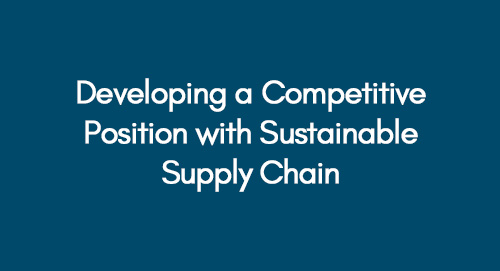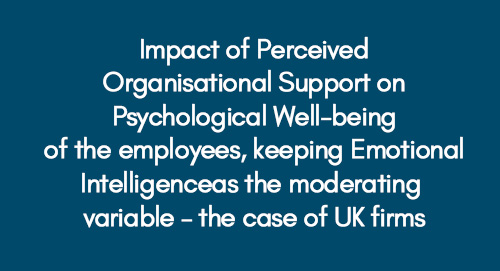
Gaining Sustainability in the Construction Industry: Integration of Life Cycle Assessment (LCA) into Building Information Modeling (BIM)
January 15, 2021
Developing a Competitive Position with Sustainable Supply Chain
January 15, 2021 Download PDF File
Download PDF File
This study in UK firms looks at how support from the workplace affects employee happiness, focusing on emotional intelligence as a potential influencer. It examines how employees' well-being might be influenced by the support they feel from their organizations.
The text pertains to the research goal of the study.
Research Aim
To determine the impacts of perceived organisational support on the psychological well-being of employees keeping emotional intelligence as the moderating variable - the case of UK firms
Introduction
The following text comprises the background of the study.
Contextual Background
In this competitive business environment, organisations have been able to increase the overall efficiency and productivity of the company with the implementation of various strategies and frameworks.
Need Help with Academic Writing? Get a Response within 24 Hours!
The study of Khan and Salahuddin (2018) identified strategies that are being employed in an organisation that increase the efficiency, performance and productivity of the employees. It has been identified that employee happiness, anxiety levels, stress levels, mental wellness, emotional state and social relations are considered the best measures to analyse the psychological well-being of employees.
However, in the same context, another study studies that amongst all these factors, organisational support and emotional intelligence in the organisation are considered the fundamental factors that can affect the well-being of the organisation as well as the well-being of its employees (Nielsen et al., 2017).
Impact of Leadership Style on Employee Performance and Motivation
The psychological well-being of employees has been considered as the best option to increase the overall effectiveness of employees and the organisation. The mental, emotional and physical well-being of employees is considered the best way to increase the overall commitment of employees and increase organisational performance (Danna and Griffin, 1999).
However, it has been argued if the company fails to support their employees and employees feel frustrated with their organisations, then it is impossible to increase their work commitment and satisfy them with their jobs (McGuire and McLaren, 2009). Therefore, it can be said that the performance of the organisation depends upon the mental, physical and emotional well-being of employees.
Various debates have been made to-date that emphasise whether the employee's psychological well-being, satisfaction and performance are dependent on the organisational support and emotional intelligence being provided to them at their jobs. This is because the stress, happiness and mental stability levels for each employee are different and this also varies with the job characteristics and the support that is being provided in an organisation.
The study of Eisenberger and Stinglhamber (2011) has studied the wellbeing of employees is related to the emotional intelligence and the organisational support being provided to the employees.
From the study, inconclusive results were obtained that showed that it is impossible to understand employee wellbeing and satisfaction with their jobs until and unless proper organisational support is delivered to them (Van De Voorde, Paauwe and Van Veldhoven, 2012). However, the increased mental and physical health of employees has become a major concern of organisations as employees are being considered as the major asset that can help in increasing the overall effectiveness and performance of the organisation.
Research Gap
Several studies have studied employee well-being and it has been identified that the well-being of employees can be related to several factors that are related to their family, friends and their job places as well (Wright and Cropanzano, 2004). Another study by Van De Voorde, Paauwe and Van Veldhoven (2012) was studied that reveals that the well-being of employees may get lower if the organisations fail to provide support to their employees or understand their emotions, or if there is a mismatch between the demands of the employees with their capabilities.
The gap between the objectivity of perceived organisational support and the subjective feelings of employees needs to be catered which results in mental instability, negative psychological states and poor mental health of employees. Moreover, no study has been carried out that focuses on identifying the impacts of emotional intelligence on both, the perceived organisational support and the psychological well-being of employees.
The study of Bakker (2015) studied various aspects of what needs to be done to maintain the psychological well-being of employees. However, the study only focuses on the physical stability and health of the employees to become a major factor that helps in increasing the overall performance of the organisation (Ogbonnaya et al., 2017).
Therefore, it can be said that the academic literature lacks empirical findings regarding the investigation of how perceived organisational support can affect the overall well-being of employees.
The study of Caesens, Stinglhamber and Ohana (2016) has mainly focused on variables such as job characteristics, autonomy at the workplace, workload, role conflicts, and intrinsic and extrinsic rewards in the context of the psychological well-being of employees. This study revealed inconclusive results, hence this gives a need to conduct the research and explore how perceived organisational support can affect the employee’s psychological wellbeing in the context of emotional intelligence at the organisation.
Objectives and Research Questions
About the above-mentioned information, the following is the main research question that has been developed to conduct the study:
"How can perceived organisational support in an organisation affect the psychological well-being of employees through emotional intelligence?"
This study aims to explore the impacts of perceived organisational support on the well-being of employees in the case of UK firms. The following objectives are established to meet this aim:
- To understand what is perceived organisational support and what the psychological well-being of employees is.
- To investigate major factors of perceived organisational support that contribute to increasing the psychological well-being of employees.
- To identify the impact of perceived organisational support on the psychological well-being of employees using emotional intelligence as the moderating variable.
- To propose effective recommendations to UK firms to increase their psychological well-being with the help of providing organisational support and emotional understanding.
This study aims to fill the research gap identified and to focus on the psychological well-being of employees influenced by the organisational support and emotional intelligence in an organisation.
Research Contribution
This study employs the findings from various studies that have been conducted in the same notion while identifying the inconclusive results to lay the main focus of the research. Past studies have focused on the mental and physical well-being of employees while this study aims to contribute by exploring the well-being of employees in terms of physical, mental, emotional/psychological aspects (Dall’Ora et al., 2016).
Moreover, fewer studies have studied these aspects of employee psychological well-being and is expected that the findings from this study will help identify the best strategies that could be used in organisations to increase the psychological well-being of the employees. the findings from this study can be implemented in UK firms to develop supporting organisations and to increase their psychological well-being at the same time. Moreover, several factors of perceived organisational support will also be identified in the study that will help establish the best strategies to be implemented in the organisation to increase the well-being and understanding of the emotions of employees.
Literature Review
The following texts are related to the literature review.
Perceived Organisational Support and Psychological Wellbeing of Employees
Perceived organisational support is defined as the general beliefs of employees that the organisation has been fulfilling the needs and demands of its employees and values for their contribution to the organisation (Aselage and Eisenberger, 2003). In general, the psychological well-being of employees is part of the contentment feelings of employees when they are provided with satisfactory treatment in the organisation.
Thompson and Prottas (2006) identified that the perceived organisational support for employees is related to the perception of employees related to the surrounding environment and the organisational culture that makes them satisfied or dissatisfied in the organisation. However, satisfaction or dissatisfaction can be related to the nature of the treatment in the organisation. Therefore, it can be said that perceived organisational support helps in evaluating the psychological well-being of employees (Kurtessis et al., 2017).
The well-being of employees is defined by Guest (2017) as the feeling of contentment and satisfaction of employees while meeting their demands and desires. It has been identified that employee wellbeing has been considered the best way to evaluate productivity and performance in an organisation. However, various contexts of well-being can be explained as related to the well-being of employees in an organisation which can be distinguished as job-related and context-free well-being (Ogbonnaya et al., 2017).
Impact of Increase in National Minimum Wage on Productivity
The study of Dall’Ora et al. (2016) has identified that the well-being of employees can be related to the mental, physical and emotional well-being of employees. It has further been studied that when employees are physically, mentally and emotionally stable with their jobs, then they are likely to be satisfied and help in maintaining their performances in the organisation.
Emotional Intelligence
According to Joseph and Newman (2010), emotional intelligence is defined as the way or capability of an individual to recognise their own emotions and feelings of themselves or others. Emotional intelligence is majorly concerned with different types of psychologies where the emotions and feelings of the people can be managed based on emotional awareness, the capability of harnessing emotions and the application of those emotions in different tasks (Goleman, Boyatzis and McKee, 2013).
In an organisational context, the emotional and psychological well-being of employees is interrelated with the ability of employees, managers and other organisational members that deal with each other regularly. It has been argued that emotional intelligence is majorly related to the people in an organisation who are capable of understanding the feelings and emotions of others and helping them in their growth and personality development (O'Boyle Jr et al., 2011). Effective leaders and organisational support are the key drivers that can help employees and other staff members feel content in the organisation and result in a healthy lifestyle and effective work-life balance.
Factors of Perceived Organisational Support
The factors of perceived organisational support can be divided into job characteristics, autonomy at the workplace, workload, role conflicts, and intrinsic and extrinsic rewards.
It has been argued by Caesens, Stinglhamber and Ohana (2016) that the perceived organisational support is majorly influenced by the job characteristics of an employee and the managerial actions perceived by the individual working in the organisation. These job characteristics can be related to the nature of the job and the variety of tasks being provided to employees.
On the other hand, autonomy at the workplace is also sometimes characterised as the major element of job characteristics while other authors distinguish it and place it under the organisational culture (Thompson and Prottas, 2006). If employees are provided with an effective organisation where managers are supportive and provide leverage to employees in the decision-making process, then it has been found that employees feel contended in their job roles which results in better performance.
Importance of Project Manager Leadership Styles in Association with Project Success Rates
The workload is considered as the other factor of perceived organisational support while excessive workload results in stress and anxiety; affecting the overall performance and wellbeing of employees (Aselage and Eisenberger, 2003). Tight deadlines and on-call duty scenarios have been affecting the mental and emotional stability of employees in an organisation, thus it can be a part of the perceived organisational support. Moreover, role conflicts also affect the wellbeing and mental stability of employees and it can be considered as a major factor of perceived organisational support that can affect the wellbeing of employees.
Conflicting job roles increase anxiety and frustration within employees which is reflected in their performances and stability in managing work and life at the same time (Caesens, Stinglhamber and Ohana, 2016).
Another one of the major factors of perceived organisational support can be rewards being provided to employees and characterised as intrinsic and extrinsic rewards. These rewards are supposed to be the major influencers that can help employees increase their job satisfaction and mental and emotional stability in life.
Impact of Perceived Organisational Support on Wellbeing and Performance of Employees
Employees perceive organisational support as the best way to increase their motivation to work better (Kurtessis et al., 2017). Not only this, but organisational support helps employees maintain psychological and emotional stability in their lives as when employees are being supported and valued in their organisation, they feel comfortable at the organisation and their stress and anxiety levels are lowered.
The organisational support being provided to employees helps them value their organisations as they are motivated to perform better. According to Aselage and Eisenberger (2003), perceived organisational support is considered the major influencer for employees that helps in maintaining a work-life and emotional balance in employees’ lives. Furthermore, organisational support enables employees to feel satisfied in their organisations, thus also resulting in high employee performance.
Research Model and Hypothesis
Following is the research model that has been developed for the research. From the figure, it has been identified that perceived organisational support is the independent variable of the study; psychological well-being of employees in terms of is considered as the independent variable while emotional intelligence is considered as the moderating variable of the study. The selection of variables has been made by reviewing the study of Caesens, Stinglhamber and Ohana (2016).

Research hypotheses are developed as follows:
- H1: there is a positive and significant impact of perceived organisational support on the psychological well-being of employees
- H2: there is a positive and significant impact of emotional intelligence on the psychological well-being of employees
Research Methods
The following are research methods of study.
Research Philosophy and Approach
Since this study aims to investigate the impacts of perceived organisational support on the well-being and performance of employees, therefore the researcher intends to use the pragmatism approach to collect, arrange, organise and interpret the results that show the validity results.
Explore the Impact of Leadership Style on the Job Satisfaction of Nurses
The pragmatism philosophy is based on the use of both, subjective and objective methods to conduct the research where, the use of human participants will help in collecting and evaluating the data (Adhariani, Sciulli and Clift, 2017). The perceived organisational support and well-being of employees can be best understood when the researcher approaches the employees by himself/herself and investigates their organisational activities that can affect the well-being of employees.
In terms of the research approach, the researcher will select a deductive approach. This is because of the fact the inclusion of human participation in the research will include facts, figures, observations and some statistical data that need to be analysed using specific scientific methods to deduce conclusive results for the study.
It has been identified by Bryman and Bell (2015) that the use of the deductive approach is helpful when the researcher is interested in selecting objective or mixed methods, including statistical and subjective methods to evaluate their views. Since the researcher aims to select the deductive approach, research hypotheses are developed that are tested using a statistical approach to determine the impacts of perceived organisational support on the well-being of employees.
Research Design
This research aimed to use the pragmatism philosophy, where the researcher has been given the liberty to select the best method that can be used in the research to meet its aim, mixed research design will be used in the research. Flick (2015) identified that the use of mixed methodology is helpful to use both, subjective and objective methods in the form of qualitative and quantitative methods to address the research questions, making it more feasible for the researcher to analyse different perspectives of the research problem.
This implies that the researcher will use a mixed methodology, where both, qualitative and quantitative data will be used to determine the impacts of perceived organisational support on the well-being of employees. The qualitative research data that will be collected for the study will be from interviews while surveys will be collected as quantitative methods. Both of these methods will be utilised to understand the well-being of employees as per the perceived organisational support being provided to them.
Data Collection and Data Analysis
According to Mkansi and Acheampong (2012), to increase the validity of the research data and findings, primary and secondary data need to be used in the research. Keeping this in mind, the researcher intends to use both primary and secondary data collection methods to avoid any misinterpretation of results.
The primary data in this study will be collected from interviews while surveys will be conducted from employees as per the quantitative data collection method. For interviews, general managers of different UK-based firms will be selected and surveys will be conducted from employees to evaluate the perceived organisational support and their wellbeing.
For the data collection, 6 UK-based firms will be selected. 10 interviews will be carried out with general managers of these firms to evaluate the well-being of employees when provided with organisational support. For surveys, 250 employees of these firms will be selected to evaluate their well-being and the organisational support provided to them.
The survey questionnaire will be made using 5 points Likert Scale while the Strongly Agree option will be at 0 and the Strongly Disagree option is at 4 (0-Strongly Agree, 1-Agree, 2-Neutral, 3-Disagree, 4-Strongly Disagree). For the secondary data collection, various existing studies on the same topic will be selected which include articles, journals, books, and other research.
A close-ended questionnaire will be developed in surveys so that employees can answer immediately about how they perceive their organisational support. The survey questionnaire will help the researcher identify the organisational support being provided by the managers at the organisation.
Furthermore, interviews will be conducted using semi-structured interview questions that will help in the questioning of employees regarding how they feel and what behaviour they adopt to keep their employees engaged and satisfied with their jobs. In this way, emotional intelligence will be judged. The data analysis of the data collected from interviews will be done through thematic analysis while correlation and regression tests will be applied to analyse the quantitative data collected through surveys.
Sampling and Sample Size
The researcher will use convenience sampling under the non-probability sampling technique to select the number of interviewees and survey respondents. A total of 250 employees will be selected from 6 UK-based firms for the survey and 10 interviews will be conducted by general managers of these firms.
Ethical Limitations
To maintain the effectiveness of the research, the researcher maintains the anonymity of all the respondents present in the study (Bryman and Bell, 2015). For this, the researcher will ensure that no exploitation of the personal information of respondents will be done in this report. Moreover, the researcher will also ensure that the content to be included in this study through secondary materials will be plagiarism-free to maintain the credibility of the research and to follow the research principles.
Here is the visual representation of the research plan and timeline.
Research Plan and Timeline

References
Adhariani, D., Sciulli, N. and Clift, R., 2017. Research methodology. In Financial management and corporate governance from the feminist ethics of care perspective (pp. 81-117). Palgrave Macmillan, Cham.
Aselage, J. and Eisenberger, R., 2003. Perceived organisational support and psychological contracts: A theoretical integration. Journal of Organisational Behavior: The International Journal of Industrial, Occupational and Organisational Psychology and Behavior, 24(5), pp.491-509.
Bakker, A.B., 2015. Towards a multilevel approach to employee well-being. European Journal of Work and Organisational Psychology, 24(6), pp.839-843.
Bryman, A. and Bell, E., 2015. Business research methods. Oxford University Press, USA.
Caesens, G., Stinglhamber, F. and Ohana, M., 2016. Perceived organisational support and well-being: a weekly study. Journal of Managerial Psychology, 31(7), pp.1214-1230.
Dall’Ora, C., Ball, J., Recio-Saucedo, A. and Griffiths, P., 2016. Characteristics of shift work and their impact on employee performance and wellbeing: A literature review. International journal of nursing studies, 57, pp.12-27.
Danna, K. and Griffin, R.W., 1999. Health and well-being in the workplace: A review and synthesis of the literature. Journal of Management, 25(3), pp.357-384.
Eisenberger, R. and Stinglhamber, F., 2011. Perceived organisational support: Fostering enthusiastic and productive employees. American Psychological Association.
Flick, U., 2015. Introducing research methodology: A beginner's guide to doing a research project. Sage.
Goleman, D., Boyatzis, R.E. and McKee, A., 2013. Primal leadership: Unleashing the power of emotional intelligence. Harvard Business Press.
Guest, D.E., 2017. Human resource management and employee well‐being: Towards a new analytic framework. Human Resource Management Journal, 27(1), pp.22-38.
Joseph, D.L. and Newman, D.A., 2010. Emotional intelligence: An integrative meta-analysis and cascading model. Journal of applied psychology, 95(1), p.54.
Khan, U.R. and Salahuddin, W., 2018. Impact of Workplace Environment on Employees’ Performance. RADS Journal of Social Sciences & Business Management, 5(1), pp.66-76.
Kurtessis, J.N., Eisenberger, R., Ford, M.T., Buffardi, L.C., Stewart, K.A. and Adis, C.S., 2017. Perceived organisational support: A meta-analytic evaluation of organisational support theory. Journal of Management, 43(6), pp.1854-1884.
McGuire, D. and McLaren, L., 2009. The impact of the physical environment on employee commitment in call centres: The mediating role of employee well-being. Team Performance Management: An International Journal, 15(1/2), pp.35-48.
Mkansi, M. and Acheampong, E.A., 2012. Research philosophy debates and classifications: students’ dilemma. Electronic journal of business research methods, 10(2), pp.132-140
Nielsen, K., Nielsen, M.B., Ogbonnaya, C., Känsälä, M., Saari, E. and Isaksson, K., 2017. Workplace resources to improve both employee well-being and performance: A systematic review and meta-analysis. Work & Stress, 31(2), pp.101-120.
O'Boyle Jr, E.H., Humphrey, R.H., Pollack, J.M., Hawver, T.H. and Story, P.A., 2011. The relation between emotional intelligence and job performance: A meta‐analysis. Journal of Organisational Behavior, 32(5), pp.788-818.
Ogbonnaya, C., Daniels, K., Connolly, S. and van Veldhoven, M., 2017. Integrated and isolated impact of high-performance work practices on employee health and well-being: A comparative study. Journal of occupational health psychology, 22(1), p.98.
Thompson, C.A. and Prottas, D.J., 2006. Relationships among organisational family support, job autonomy, perceived control, and employee well-being. Journal of occupational health psychology, 11(1), p.100.
Van De Voorde, K., Paauwe, J. and Van Veldhoven, M., 2012. Employee well‐being and the HRM–organisational performance relationship: a review of quantitative studies. International Journal of Management Reviews, 14(4), pp.391-407.
Wright, T.A. and Cropanzano, R., 2004. The role of psychological well-being in job performance:: a fresh look at an age-old quest. Organisational Dynamics, 33(4), pp.338-351.
Get 3+ Free Dissertation Topics within 24 hours?



























